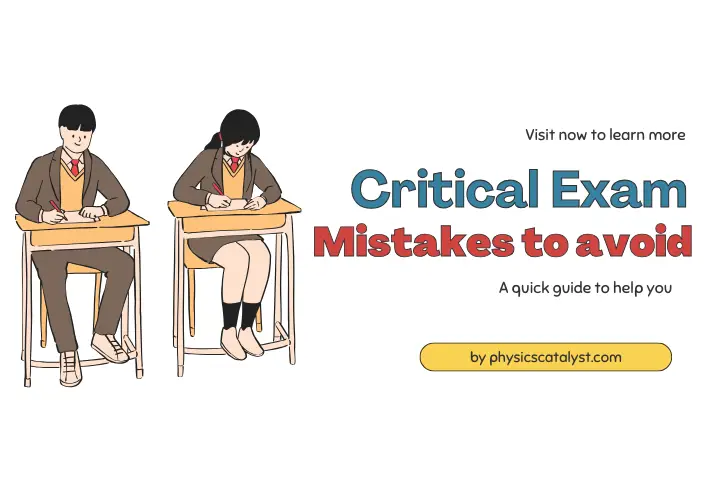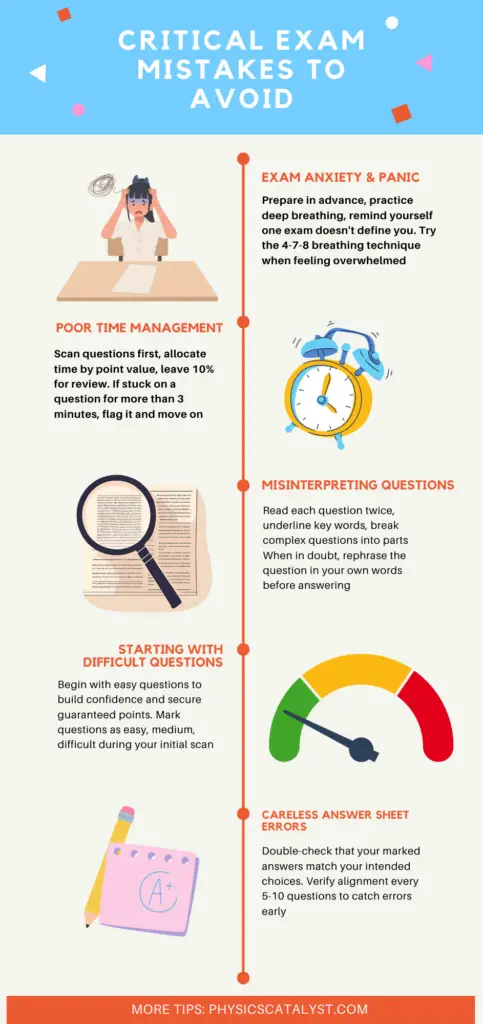
Introduction
Exams are a crucial part of academic life, but they can also be a significant source of stress and anxiety. Even the most prepared students can falter due to common mistakes that undermine their performance. This guide identifies ten critical errors students frequently make during examinations and provides practical strategies to avoid them, ensuring you can showcase your true knowledge and abilities when it matters most.
Before the Exam
1. Panicking Before or During the Exam
Anxiety can severely impact your performance, making it difficult to recall information and think clearly.
How to Avoid This:
- Prepare thoroughly weeks before the exam, not just the night before
- Practice relaxation techniques like deep breathing and positive visualization
- Get 7-8 hours of sleep the night before the exam
- Remind yourself that one exam doesn’t define your worth or future
- Use the 4-7-8 breathing technique when feeling overwhelmed (inhale for 4 seconds, hold for 7, exhale for 8)
- Create and review condensed study notes to boost confidence
2. Arriving Late for the Exam
Rushing into an exam room heightens stress and can disrupt your concentration for the entire test period.
How to Avoid This:
- Plan to arrive 30 minutes before the scheduled start time
- Prepare everything you need the night before
- Check your transportation options in advance
- Set multiple alarms if you’re concerned about oversleeping
- Account for potential traffic or public transportation delays
- Consider a practice run to the exam location if it’s unfamiliar
3. Failing to Bring Required Materials
Forgetting essential items can cause unnecessary stress and may even result in penalties.
How to Avoid This:
- Create a checklist of required items (ID, admission ticket, stationery, calculator, etc.)
- Pack your bag the night before the exam
- Bring backup supplies (extra pens, pencils, erasers, etc.)
- Check the exam regulations to ensure you know exactly what’s allowed
- Consider keeping a dedicated “exam kit” with all necessary materials
- Ask instructors in advance about what will be needed for the exam
During the Exam
4. Neglecting to Review All Questions First
Diving straight into answering without scanning the entire exam can lead to poor time management.
How to Avoid This:
- Spend the first 3-5 minutes reviewing all questions
- Mark easy questions with a checkmark and difficult ones with an ‘X’
- Note the point value of each question to prioritize high-value items
- Allocate time based on the weight of each section
- Create a quick mental roadmap of how you’ll approach the exam
- Look for connections between questions that might provide helpful hints
5. Misinterpreting Questions
One of the most common causes of lost points is simply not answering what was asked.
How to Avoid This:
- Read each question at least twice before answering
- Underline or circle key instruction words (analyze, compare, explain, etc.)
- Break complex questions into smaller parts
- If time permits, rephrase the question in your own words
- Pay attention to qualifiers like “all,” “none,” “always,” or “never”
- When in doubt, ask for clarification if the exam rules allow it
6. Poor Time Management
Running out of time before completing the exam is a common and preventable mistake.
How to Avoid This:
- Allocate time proportionally to the value of each question or section
- Set mini-deadlines throughout the exam period
- Wear a watch or keep an eye on the clock in the exam room
- If stuck on a difficult question, move on and return later
- Leave time at the end for review (10% of the total exam time)
- Practice timing yourself during mock exams
7. Starting with Difficult Questions
Beginning with challenging questions can consume excessive time and shake your confidence.
How to Avoid This:
- Answer easy questions first to build momentum and confidence
- Secure those “guaranteed” points before tackling more difficult areas
- Use the confidence boost from answering known questions to tackle harder ones
- Remember that all questions usually carry the same marks regardless of difficulty
- Flag difficult questions to return to later
- Recognize when a question is taking too long and be willing to move on
8. Careless Errors on Answer Sheets
Simple mistakes in recording answers can negate all your hard work and preparation.
How to Avoid This:
- Double-check multiple-choice answer sheets for correct question numbering
- Verify that your marked answer matches your intended choice
- If using scantron sheets, check periodically to ensure alignment
- Take a moment after each answer to confirm it’s correctly recorded
- Use a ruler or blank paper to keep your place on answer sheets
- Review your answer sheet before submitting
9. Forgetting to Include Personal Information
Submitting work without proper identification can lead to scoring delays or even ungraded exams.
How to Avoid This:
- Fill out all personal details immediately upon receiving the exam materials
- Double-check that your name, ID number, and other required information are correct
- Ensure your information appears on all separate answer sheets or booklets
- Follow specific instructions for where and how to record identifying information
- If using multiple sheets, put your name on each one
- Make this your very first task before even reading the exam questions
10. Poor Writing Skills and Presentation
Illegible handwriting and disorganized answers can make it difficult for examiners to award you full marks.
How to Avoid This:
- Write clearly and legibly, even when under time pressure
- Structure essays with clear introductions, body paragraphs, and conclusions
- Use paragraphs, bullet points, and numbering to organize information
- Leave some space between answers for potential additions
- If your handwriting deteriorates under pressure, practice writing quickly but clearly
- Consider practicing with past papers under timed conditions to improve speed without sacrificing legibility

Conclusion
Avoiding these common mistakes can significantly improve your exam performance. Remember that preparation is key—not just studying the material, but also preparing your mindset and approach to the exam itself. By implementing these strategies, you’ll be able to demonstrate your knowledge more effectively and achieve results that truly reflect your abilities.
Additional Tips
- Stay hydrated and bring water if allowed
- Read all instructions carefully before beginning
- If you finish early, use the remaining time to review your answers
- Trust in your preparation and maintain a positive mindset
- Focus on your own exam, not what others around you are doing

(y)
Thank you for providing nice information about common mistakes in exam, This topic will be definitely useful for CBSE students .After passed the 12th board exam if chose career in engineering, Siddhartha institute of technology and sciences is one of the Best Engineering institutes in Hyderabad.SITS believes in ‘fuelling the quest for knowledge? which ensures individual professional success, which culminates in benefiting the Society